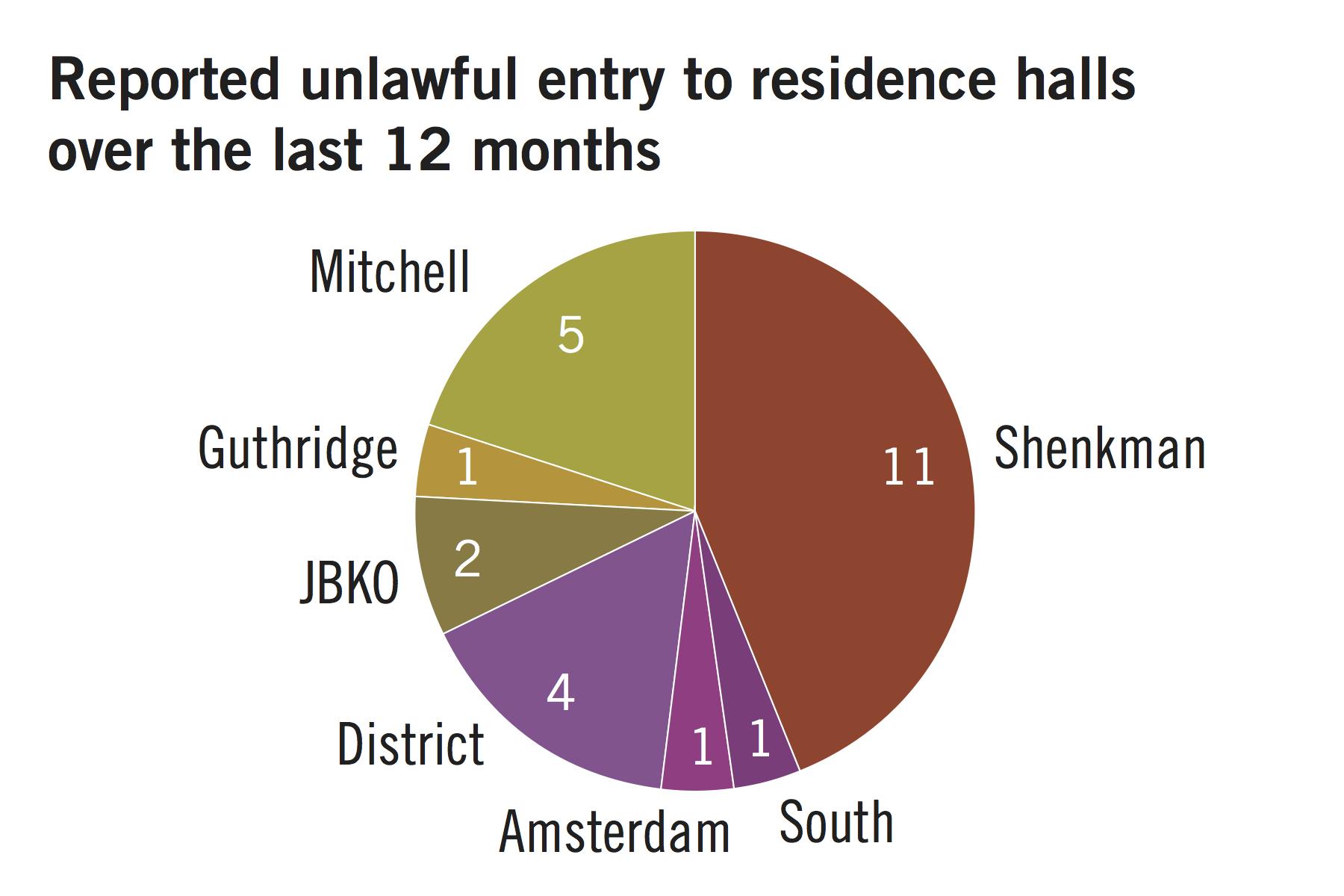
Yonah Bromberg Gaber | Graphics Eidtor
Source: University Crime Log
People previously banned from campus keep finding their way back to Shenkman Hall.
Since 2011, 39 unlawful entries have been reported in Shenkman – the most of any building or public space on campus – and about one-third of all such offenses that were reported in residence halls have occurred in the building, according to an analysis of the GW crime log. Experts said more people illegally enter a residence hall when students are less aware of strangers trailing behind them to enter buildings and when security guards are not stationed to monitor who enters the hall.
Eleven unlawful entries have been reported in Shenkman in the last year – about 30 percent of all such reports in the building over the last six years, according to the crime log.
Darrell Darnell, the senior associate vice president for safety and security, said buildings with public dining options, like Shenkman Hall and District House, tend to have more unlawful entries because people without a connection to the University frequently enter the building. District House has had four unlawful entries since it opened in August, according to the crime log.
“Because of this transient, urban environment, individuals not affiliated with GW may sometimes enter these eating areas and refuse to leave at closing or engage in activity that violates university, local or federal laws,” he said in an email.
Shenkman Hall houses 730 upperclassman on 10 floors, with four food vendors on the first floor and basement.
The majority of people cited for unlawful entry are either not affiliated with GW or enter buildings where they are not allowed to stay, Darnell said. When an individual illegally enters a GW building, they are barred from returning to University property and if they return, they could be arrested for trespassing, he said.
Out of the 21 arrests for unlawful entries across campus between December 2016 and April 2017, two-thirds of the individuals involved had been previously barred, according to Metropolitan Police Department reports.
In April, UPD arrested two previously barred individuals for unlawful entry in Shenkman. In March, UPD arrested a 53-year-old woman, who refused to leave a bathroom in the basement of the residence hall, after determining that she had been barred last August.
Darnell declined to say if more officers have monitored the area and if the University Police Department has changed its procedures to prevent people from illegally gaining access to buildings.
Overall, 119 unlawful entries in residence halls have been recorded since 2011 – making up almost 43 percent of the total 278 reported unlawful entries on campus.
Following Shenkman, Mitchell Hall had 29 reported unlawful entries, with 72 percent of those located in the 7-Eleven attached to the building, according to the crime log.
Experts said to prevent these offenses, students should be more aware of who they hold open doors for on their way into the residence halls.
Kyle Gordon, the vice president of business development at Stanley Black & Decker, a Connecticut-based manufacturer for security products like surveillance equipment, said universities can create a student committee to get input on campus crime and facilitate an open dialogue about safety concerns between officials and students.
Student Association leaders have been working since January 2016 to create a UPD student advisory board to provide an outlet for students to express safety concerns.
“If the building is open during the day, the risk for potential unlawful entries goes up during that time period,” Gordon said.
Gordon said security features – like lighting around the building, the presence of law enforcement and video surveillance – can help prevent unlawful entries.
Six out of the 10 unlawful entries reported in residence halls this academic year have occurred in Shenkman Hall since the beginning of the school year, according to the crime log.
Two weeks ago, a 59-year-old man who had previously been caught trespassing was arrested for unlawful entry and attempted second degree theft in Amsterdam Hall after video surveillance caught him trying to get into residential rooms.
Universities can be held legally responsible if unaffiliated individuals endanger the safety of students within a building, some experts said.
Pat Murphy, the president of LPT Security Consulting, said it is more difficult to regulate who has access to the area where residents live when residential areas contain public spaces.
Murphy added that if people are illegally entering a residence hall, a university police department should determine how people are gaining access and how accessible the hall is to the public.
“How much risk is the University willing to take that something bad won’t happen?” he said.




